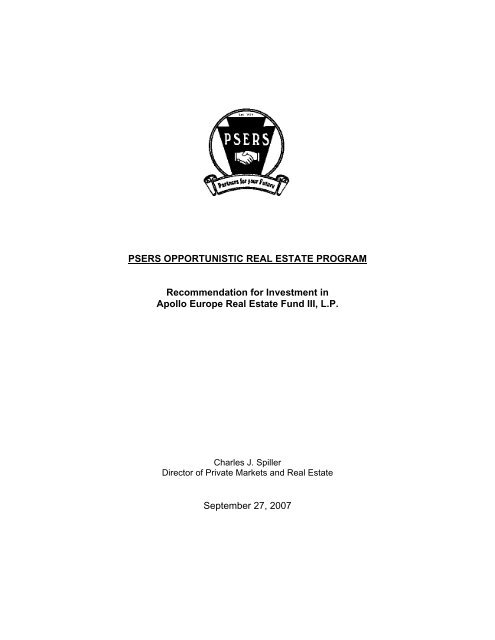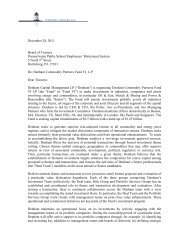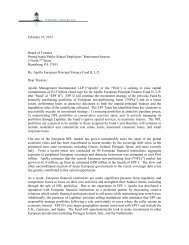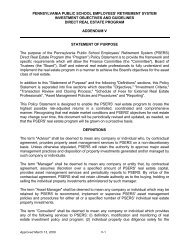PSERS OPPORTUNISTIC REAL ESTATE PROGRAM ...
PSERS OPPORTUNISTIC REAL ESTATE PROGRAM ...
PSERS OPPORTUNISTIC REAL ESTATE PROGRAM ...
You also want an ePaper? Increase the reach of your titles
YUMPU automatically turns print PDFs into web optimized ePapers that Google loves.
<strong>PSERS</strong> <strong>OPPORTUNISTIC</strong> <strong>REAL</strong> <strong>ESTATE</strong> <strong>PROGRAM</strong><br />
Recommendation for Investment in<br />
Apollo Europe Real Estate Fund III, L.P.<br />
Charles J. Spiller<br />
Director of Private Markets and Real Estate<br />
September 27, 2007
EXECUTIVE SUMMARY<br />
Apollo Europe Real Estate Fund III, L.P.<br />
Apollo European Real Estate Fund III, L.P. (the “U.S. Fund”) is a private real estate<br />
investment partnership to be sponsored by Apollo Real Estate Advisors (“Apollo”), which<br />
will invest in real estate assets and portfolios in Europe.<br />
The Fund will be Apollo’s ninth real estate opportunity fund since 1993. Apollo EU Real<br />
Estate Advisors III, L.P. (the “General Partner”) will serve as the General Partner of the<br />
Fund, and its principals and those of its affiliates and certain associated investors will<br />
personally invest at least $15 million in the Fund.<br />
The Fund’s objective will be to provide its partners with superior risk-adjusted returns by<br />
making and managing investments in real estate assets and portfolios in Europe. The<br />
Fund will target a compound annual internal rate of return (“IRR”) on its investments of<br />
between 16% and 20% over a projected two- to seven-year holding period.<br />
An attractive European real estate investment environment continues to be available to<br />
investors with proven real estate expertise, local market knowledge and the ability to<br />
execute sophisticated investment strategies. Apollo’s twelve year track record in Europe<br />
and extensive network of local joint venture partners give it the qualifications and<br />
competitive advantages necessary to successfully invest and manage the Fund. Apollo<br />
expects to continue to apply the investment approach it has employed in the management<br />
of the European investments of the prior funds.<br />
The objective of the Fund is to create a balanced portfolio of opportunistic assets, both in<br />
terms of asset class and geographical spread, across Europe. Appropriate levels of<br />
leverage will be employed to enhance returns. The Fund’s investments will be sourced<br />
and overseen by Apollo’s London office, which currently consists of eighteen<br />
professionals, sixteen of whom are European nationals.<br />
THE SPONSOR<br />
Apollo Real Estate Advisors was founded in 1993 by William Mack, a prominent U.S. real<br />
estate investor, and Apollo Advisors, a private equity firm that has managed in excess of<br />
$25 billion in equity since its formation in 1990. Mr. Mack and the senior partners of<br />
Apollo Advisors recognized opportunities in the distressed property markets in the United<br />
States in the early 1990’s and concluded that an expert team of real estate professionals,<br />
employing active hands-on management, could deliver attractive total returns and<br />
multiples on equity invested to institutional investors. As a result, the first fund, the Apollo<br />
Real Estate Investment Fund, L.P., was established in April 1993 with $500 million of<br />
equity capital.<br />
Since 1993, Apollo has significantly grown its funds under management to approximately<br />
$8.7 billion. Initially focused exclusively on opportunity-style investing, Apollo recently<br />
expanded its offerings to clients with the acquisition of the Value Enhancement Funds<br />
which, acquired in March 2004, are focused on value added opportunities in the United<br />
States of America. Apollo has also continued to expand its real estate lending program<br />
raising a successor fund based on the success of its first real estate mezzanine fund.<br />
Apollo also manages specific joint ventures with institutional investors.<br />
Apollo has been investing in Europe since 1995 and, in 2000, established a dedicated<br />
team in London to source and oversee European real estate investments. This team<br />
currently consists of eighteen professionals, sixteen of whom are European. Apollo’s<br />
<strong>PSERS</strong> Private Investments<br />
Page 2 of 8
European operations are led from the London office by William Benjamin, John<br />
Robertson, Michael Pashley and Paul Stanford (the “Principals”). Apollo has been among<br />
the most active opportunity investors globally. The firm has been able to achieve this<br />
level of activity and a very strong track record by focusing on real estate operating and<br />
market fundamentals and by identifying experienced local operating partners with<br />
excellent access to “off-market” transaction flow. Apollo began investing in Europe in<br />
1995 through its four global finite-lived, closed-end funds: the Apollo Real Estate Funds I–<br />
IV. In 2000, Apollo established a London office and raised the International Fund and in<br />
2005 raised the European Fund II. These funds have followed an opportunistic<br />
investment approach and sought to provide IRRs on investments in excess of 20%.<br />
Apollo’s institutional investors consist of some of the largest institutional investors in the<br />
United States, Europe, the Middle East and Australia. These include large public and<br />
private sector pension funds, major insurance companies, financial service firms,<br />
university endowments, foundations, and charitable trusts.<br />
Apollo Real Estate Advisors, the group of related investment management partnerships of<br />
the Apollo real estate funds, is owned by the partners of Apollo and its affiliates. The<br />
partners of Apollo Real Estate Advisors and of its affiliates form the general partner for<br />
each of the Apollo real estate funds and invest meaningful amounts of their own capital<br />
alongside the limited partners in these funds. To date, Apollo’s partners have committed<br />
approximately $194 million of their own resources to the Apollo real estate opportunity<br />
equity funds, including $15 million to the European Fund II.<br />
Apollo is a group of related investment management partnerships which oversees eight<br />
prior opportunistic real estate investment funds, two debt funds, six value added funds,<br />
and a number of joint ventures on behalf of its principals and investors (the “prior funds”).<br />
Apollo’s prior opportunity funds are:<br />
• the $500 million Apollo Real Estate Investment Fund, L.P. (“Fund I”);<br />
• the $570 million Apollo Real Estate Investment Fund II, L.P. (“Fund II”);<br />
• the $1.05 billion Apollo Real Estate Investment Fund III, L.P. (“Fund III”);<br />
• the $1.09 billion Apollo Real Estate Investment Fund IV, L.P. (“Fund IV”);<br />
• the $700 million Apollo Real Estate Investment Fund V, L.P. (“Fund V”);<br />
• the $336 million Apollo International Real Estate Fund, L.P. (the “International<br />
Fund”);<br />
• the $600 million Apollo European Real Estate Fund II, L.P. (the “European Fund<br />
II”); and<br />
• the $630 million SUN-Apollo India Real Estate Fund LLC (“India Fund”)<br />
SPONSOR’S APPROACH TO INVESTING<br />
Since 1995, Apollo has developed a European real estate investing approach that it has<br />
refined in the course of investing the International Fund and the European Fund II.<br />
Apollo’s European opportunistic strategy is primarily as a “value” rather than a “growth”<br />
investor. It focuses on the acquisition of fundamentally sound, but under-managed,<br />
income-producing assets from institutional sellers in the major European markets and<br />
seeks to add value through aggressive asset management with proven local joint venture<br />
partners. Apollo undertakes selective development projects when risk-adjusted returns<br />
are compelling.<br />
The key elements of Apollo investment approach are summarized below:<br />
<strong>PSERS</strong> Private Investments<br />
Page 3 of 8
Major Real Estate Asset Classes. Apollo currently invests primarily in the major<br />
property types including retail, office and warehouse/light industrial and, to a lesser extent,<br />
residential and hospitality. Although, some of the prior funds made selective investments<br />
in real estate related operating companies, the International Fund and the European Fund<br />
II have de-emphasized such investments.<br />
“Off-Market” Transactions. Apollo concentrates on “off-market” transactions and rarely<br />
participates in widely marketed auctions, in which competition is intense and the potential<br />
for large due diligence costs squandered on unsuccessful transactions is high. Apollo<br />
typically sources transactions in conjunction with its local operating partners from<br />
motivated sellers who wish to conduct one-on-one negotiations, or who are contacting a<br />
small number of select, qualified buyers able to conclude transactions quickly.<br />
Proven Joint Venture Partners with Local Expertise. Generally, Apollo undertakes its<br />
investments with experienced joint venture partners. These local operators are extremely<br />
important in originating off-market transactions and performing day-to-day asset<br />
management responsibilities. These partners typically invest between 5% and 50% of the<br />
total equity requirement for each investment and provide asset management services<br />
pursuant to a pre-agreed business plan. Generally, partnership meetings are conducted<br />
every month, and Apollo has significant input to the operation of the assets. Ultimately,<br />
Apollo maintains approval rights over all major decisions and has the power to remove<br />
joint venture partners in the event of non-performance. A description of some of Apollo’s<br />
selected local partners and an overview of the nature of their co-investing relationship with<br />
Apollo can be found later in this section.<br />
Major Markets. Apollo intends to continue to focus on the major European markets of the<br />
UK, France, Germany and Spain and the principal cities of smaller markets such as<br />
Warsaw, Prague, Bucharest and Budapest. Apollo concentrates on investing in the major<br />
European markets but has increasingly begun to identify attractive opportunities in<br />
Eastern Europe which are often focused on development or regeneration opportunities.<br />
Over 41% of Apollo’s European investments (measured by equity commitments) have<br />
been in the UK, Europe’s largest real estate market in terms of capitalization. The<br />
remaining investments have been predominantly in the major European economies,<br />
including Germany, France and Spain. Given the weight of money acquiring income<br />
producing assets in the UK, the European Fund II has reduced its UK exposure in favor of<br />
other markets such as Germany and Switzerland. In addition, Apollo intends to target<br />
selected investments in Central and Eastern European countries recently admitted into<br />
the EU (including Poland, Bulgaria, Romania, the Czech Republic and Hungary). Apollo<br />
concentrates on these markets, in part, because they provide the most liquidity upon exit.<br />
Apollo also anticipates undertaking selected investments on a limited basis in non-EU<br />
countries such as Russia, Turkey, and the Ukraine.<br />
Medium-Sized Investments. Apollo generally makes medium-sized real estate<br />
investments. The average equity invested in each of the 93 European investments in the<br />
prior funds is approximately $15 million. No single investment in the European Fund II, to<br />
date, has represented more than 6% of the total fund size. By targeting mid-sized equity<br />
investments, Apollo is able to participate in a broad section of the investment market.<br />
Risk Aversion. In addition to diversification, Apollo further seeks to reduce risk in its<br />
portfolio by focusing primarily on income-producing assets where value can be created by<br />
filling vacancies, extending lease terms, increasing rents and selectively adding value<br />
through capital improvements and expansions. Historically, Apollo’s European<br />
investments have been allocated 64% to income producing assets and 36% to<br />
<strong>PSERS</strong> Private Investments<br />
Page 4 of 8
development and repositioning. However, when Apollo does undertake new development<br />
or repositioning, it typically does so in conjunction with a substantial level of pre-leasing or<br />
the possibility of a forward sale.<br />
Rigorous Underwriting and Approval Process. Once an opportunity has been<br />
identified, Apollo will subject all investments to a rigorous underwriting process which is<br />
intended to assess all the important aspects of the investment.<br />
THE INVESTMENT OPPORTUNITY IN EUROPE<br />
Strong GDP Growth. The EU countries, along with Russia, Turkey and the Ukraine,<br />
have enjoyed strong GDP growth since 2004, and consensus forecasts are for average<br />
annual GDP growth of EU countries of 3.1% from 2007 to 2010 versus 3.0% expected in<br />
the United States over the same period. Economic and political reform has increased the<br />
efficiency of Europe’s labor markets, while modest interest rates have encouraged reinvestment<br />
in enterprise. Countries in CEE are expected to show the fastest real GDP<br />
growth in Europe over the short to medium term, led by Slovakia at 5.6% and both Russia<br />
and the Ukraine at 5.4%. The largest European economies of the U.K., France and<br />
Germany are also expected to show steady economic growth, averaging a combined<br />
2.0% over the next four years.<br />
It is important to note, however, that the Central and Eastern European economies are<br />
much smaller than the large Western European economies. When looking at expected<br />
GDP growth over the next four years in real dollar terms, the large Western European<br />
economies of the UK, Germany, and France are expected to have the largest additions to<br />
real GDP in Europe followed by Russia. Germany’s expected 1.5% annual real GDP<br />
growth between 2007 and 2010 would add a total of $134 billion of real GDP, whereas the<br />
Ukraine’s expected 5.4% annual real GDP growth between 2007 and 2010 would only<br />
add a total of $14 billion of real GDP. Between 2007 and 2010, the EU as a whole is<br />
expected to add $878 billion of GDP versus an expected $1,170 billion in the United<br />
States over the same period.<br />
Russia and Turkey, with their expected average four year real GDP growth of 5.4% and<br />
5.0% respectively, are forecast to add a combined $189 billion of real GDP, a figure<br />
greater than that of Spain and Italy combined.<br />
Eastward European Expansion. On May 1st 2004, the EU Accession Treaty entered<br />
into force, welcoming ten new members in the Union, increasing the number of EU<br />
countries to 25. This first expansion of the EU since 1995 increased the EU population by<br />
over 74 million and represented the first accession of former Communist countries (with<br />
the exception of the former East Germany). On January 1st 2007, the EU underwent<br />
another expansion, this time welcoming Romania and Bulgaria and bringing the total<br />
number of countries to 27. EU membership granted to Hungary, the Czech Republic,<br />
Poland, several Baltic States, Bulgaria and Romania has had a significant effect on the<br />
composition of the European Union. The EU population has increased by 27% from 386<br />
million to 490 million and GDP has increased by approximately $340 billion. At the same<br />
time, however, with the inclusion of poorer CEE countries, 2006 EU per capita GDP is<br />
$20,395 versus $24,956 if only the pre-2004 EU countries were included. In the future,<br />
the EU may continue to grow, with Croatia, Macedonia, and Turkey currently candidates<br />
for EU membership.<br />
Although not part of the EU, the economies of Russia, Turkey and the Ukraine are<br />
significant and are increasingly regarded by Apollo as attractive areas for the deployment<br />
of capital, particularly as reform of legal and political infrastructure accelerates. Real<br />
<strong>PSERS</strong> Private Investments<br />
Page 5 of 8
estate investment in these three countries has increased from $125 million in 2001 to<br />
$700 million in 2005, albeit from a low base. With a combined 263 million people and<br />
$883 billion in GDP, which represents roughly the size of the Spanish economy, these<br />
three countries alone have a population greater than half of the total current EU<br />
population but less than ten percent of total EU GDP. They also represent a major land<br />
mass and have significant natural resources.<br />
Liquid Markets. Europe has seen a significant increase in real estate liquidity over the<br />
last few years, with overall transaction volume more than doubling from €79 billion in 2000<br />
to €164 billion in 2005. The U.K. and Germany together account for over two thirds of<br />
2005 volume (€111 billion), underpinning their position as the leading European real<br />
estate markets. Transaction volume in CEE markets, including Russia, Turkey and the<br />
Ukraine, has also increased dramatically; transaction volume has grown over fifteen times<br />
from €460 million in 2000 to €7.1 billion in 2005. Despite the large increase of<br />
transactions in CEE, however, these markets still only represent 4% of European overall<br />
transaction volume. Newly integrated Eastern European countries will continue to mature<br />
and provide markets where high demand will create value on exit from an investment. As<br />
evidenced by the increased flows of capital into CEE, these markets appear to be now<br />
attracting institutional investors.<br />
MANAGEMENT OF THE FUND<br />
William Mack, Founding Partner. Mr. Mack is a founder and Senior Partner of Apollo<br />
Real Estate Advisors and is the President of the corporate general partners of the Apollo<br />
Real Estate Investment Funds. With 42 years of experience in the U.S. real estate<br />
industry, he is recognized as one of its leading figures. Mr. Mack is also a Senior Partner<br />
of the Mack Organization, a national owner of industrial buildings and other income<br />
producing real estate investments. Mr. Mack serves as Chairman of the Board of<br />
Directors of Mack-Cali Realty Corporation and has been a Director of Mack-Cali since the<br />
1997 merger of the Mack Organization's office portfolio into Mack-Cali, one of the largest<br />
publicly traded real estate investment trusts in the United States. Mr. Mack also serves as<br />
the Vice Chair of the University of Pennsylvania Board of Trustees, as Vice Chairman of<br />
the University of Pennsylvania's Wharton School of Business, as Vice Chairman of the<br />
North Shore Long Island Jewish Health System and as Chairman of the Board of the<br />
Guggenheim Foundation. Mr. Mack attended the University of Pennsylvania's Wharton<br />
School of Business and received a B.S. in Business Administration from the New York<br />
University School of Business.<br />
Lee Neibart, Senior Partner. Mr. Neibart has been a Partner of Apollo Real Estate<br />
Advisors since 1993. From 1989 to 1993, Mr. Neibart was with the Robert Martin<br />
Company, most recently as Executive Vice President and Chief Operating Officer. Robert<br />
Martin was a real estate development and management firm with a portfolio of<br />
approximately seven million square feet of commercial real estate. Mr. Neibart is a<br />
Director on various boards relating to Apollo's investment portfolio. Mr. Neibart also<br />
serves on the Advisory Boards of both The Enterprise Foundation and The Real Estate<br />
Institute of New York University. He is also a past President of the New York Chapter of<br />
the National Association of Industrial and Office Parks. Mr. Neibart graduated with a BA<br />
from the University of Wisconsin and an MBA from New York University.<br />
William Benjamin, Managing Partner. Mr. Benjamin has been associated with Apollo<br />
since 1995 and established the London office in 2000. He has been the primary director<br />
of Apollo's European activities since their commencement in 1995, and Apollo's Indian<br />
activities since their commencement in 2005. From 1986 to 1995, Mr. Benjamin was with<br />
<strong>PSERS</strong> Private Investments<br />
Page 6 of 8
the Real Estate Finance Group of Bankers Trust of New York Corp., where he was<br />
responsible for the origination, structuring and execution of real estate investment banking<br />
transactions. Mr. Benjamin graduated magna cum laude with a BA from Harvard College<br />
and received an MBA from the University of Pennsylvania's Wharton School of Business.<br />
John Robertson, Partner. Mr. Robertson is responsible for the origination and<br />
structuring of UK and continental European real estate investments. Prior to joining<br />
Apollo in 2001, Mr. Robertson was Chief Executive of Portfolio Holdings, one of Apollo's<br />
principal UK operating partners. Mr. Robertson has acquired a specialist knowledge of<br />
the retail sector including serving for nine years as non-executive Director of a UK quoted<br />
department store group. Mr. Robertson has also been involved in the establishment of<br />
the Sun-Apollo fund for India and is a member of the investment committee for that fund.<br />
Mr. Robertson graduated with a Bachelor of Science from Reading University.<br />
Michael Pashley, Partner, European CFO. Mr. Pashley has been associated with the<br />
Apollo Real Estate funds since 1998 and is Apollo's Chief Financial Officer for Europe.<br />
Mr. Pashley’s principal responsibilities include transaction structuring and funding, interest<br />
rate and foreign exchange hedging, investor reporting and fund administration. Prior to<br />
working with Apollo, Mr. Pashley was a Senior Vice President and UK Financial Controller<br />
at Lehman Brothers. Mr. Pashley has considerable international experience, having<br />
worked on assignments throughout Europe with his previous employers as well as a five<br />
year assignment in Hong Kong and Singapore during his twelve years with Ernst &<br />
Young. Mr. Pashley has an Accounting degree and is a member of the Institute of<br />
Chartered Accountants of England and Wales.<br />
John Jacobsson, Managing Partner. Mr. Jacobsson has been associated with Apollo<br />
since its founding in 1993 and is a Managing Partner responsible for new investments and<br />
investment management. From 1990 to 1993, Mr. Jacobsson was a member of the<br />
acquisitions group of Trammell Crow Ventures in Dallas, Texas, where he executed<br />
investment transactions on behalf of an opportunistic real estate investment fund. Mr.<br />
Jacobsson is a Trustee of Groton School. Mr. Jacobsson graduated cum laude with a BA<br />
in East Asian Studies from Harvard College.<br />
Stuart Koenig, Partner, Global CFO. Mr. Koenig has been associated with Apollo since<br />
1995 as its Chief Financial Officer. Prior to that time, Mr. Koenig was a Vice President in<br />
the Real Estate Principal Investment Area of Goldman, Sachs & Co. where he served as<br />
Controller and Director of Investor Relations for the Whitehall real estate investment<br />
funds. Mr. Koenig received a BA in English from the State University of New York at<br />
Binghamton and an MBA in Accounting from the Bernard M. Baruch College of the City<br />
University of New York.<br />
Richard Mack, Managing Partner. Mr. Mack has been associated with Apollo since its<br />
founding in 1993 and is a Managing Partner responsible for new investments and<br />
investment management. Previously, Mr. Mack had been a member of the Real Estate<br />
Investment Banking Department at Shearson Lehman Hutton. Mr. Mack serves as a<br />
President of the non-profit HES Community Center, which serves the residents of<br />
Canarsie, Brooklyn. Mr. Mack is a member of the Executive Committee and the advisory<br />
board of Zell Lurie Real Estate Center at Wharton. Mr. Mack graduated from the Wharton<br />
School of Business with a BS in Economics and with a JD from the Columbia University<br />
School of Law.<br />
<strong>PSERS</strong> Private Investments<br />
Page 7 of 8
CONCLUSION/RECOMMENDATION<br />
Based upon the successful track record and experience of the principals and the<br />
recommendation of <strong>PSERS</strong>' consultant, Courtland Partners, Ltd., staff recommends that<br />
the Board invest an amount equal to 25 percent of the committed capital, but not to<br />
exceed €100 million plus reasonable normal investment expenses, in Apollo Europe Real<br />
Estate Fund III, L.P. The final terms and conditions of the investment must be satisfactory<br />
to the Investment Office, the Office of Chief Counsel, and the Executive Director.<br />
<strong>PSERS</strong> Private Investments<br />
Page 8 of 8
















